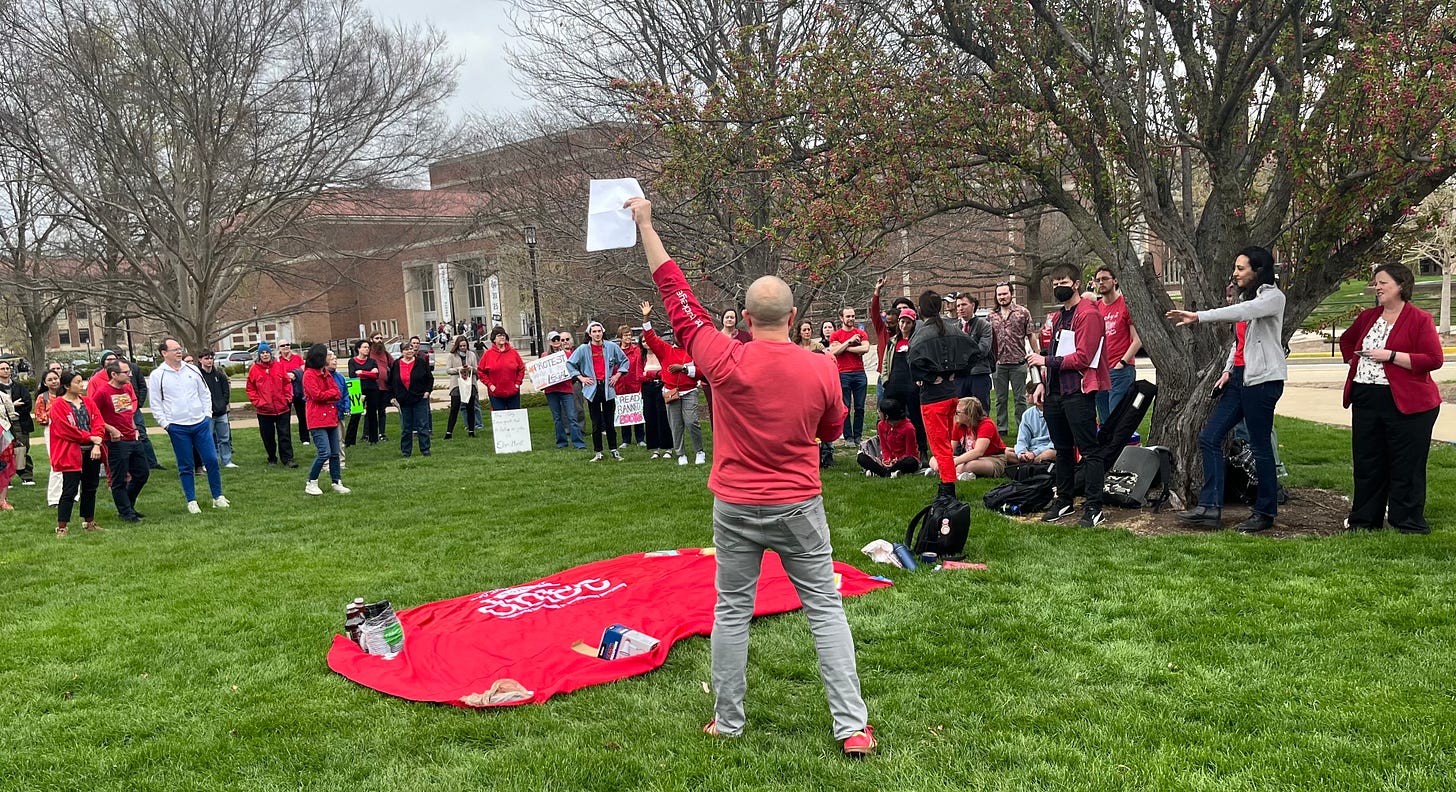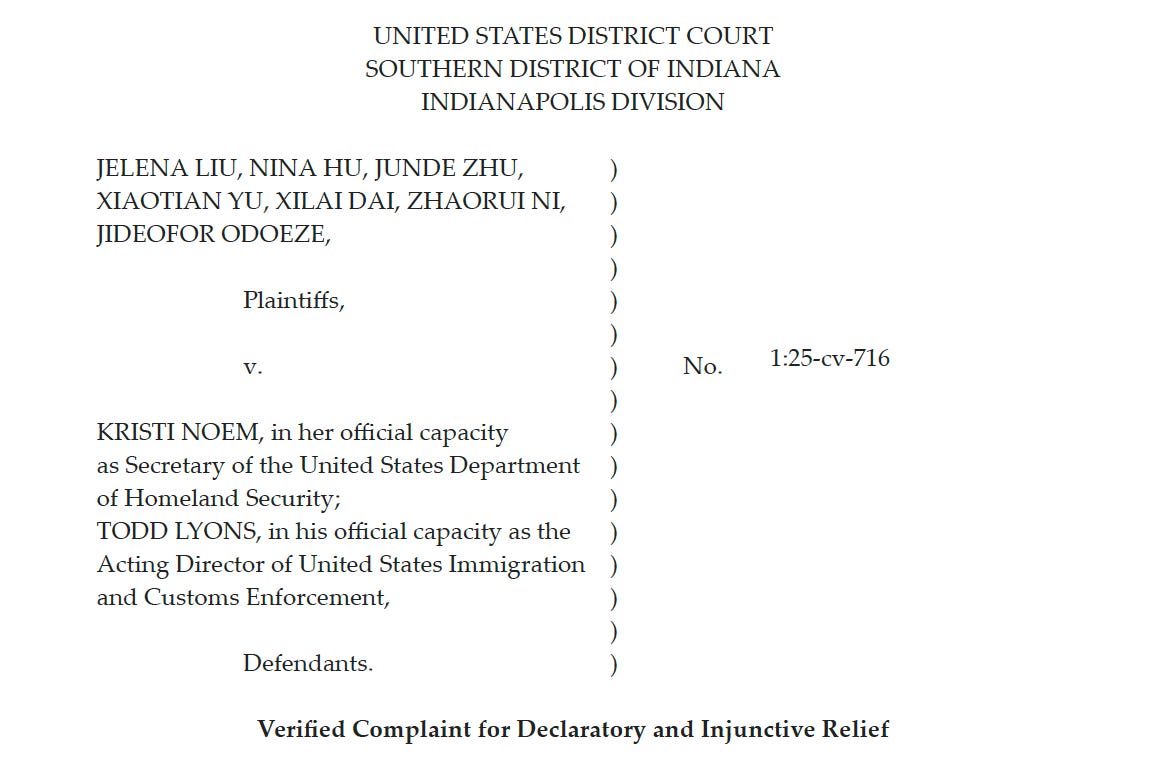Federal judge denies halt to 5 Purdue students’ revoked visas
Rally on campus chides administration for remaining silent in face of federal threats.
Support for this edition comes from Food Finders Food Bank, presenting its Blue Jean Ball May 3. The annual event and auction raises funds for Food Finders’ mission of serving 84,000 individuals across a 16-county service area who are one emergency away from hunger. Check here for tickets and to see items available in the auction.
FEDERAL JUDGE DENIES HALT TO 5 PURDUE STUDENTS’ REVOKED VISAS
A federal judge Thursday denied a temporary restraining order requested by seven university students in Indiana – five of them citizens of China studying at Purdue – after they filed a lawsuit this week contending that their student visas had been revoked illegally and that they faced the threat of deportation.
U.S. District Judge James Patrick Hanlon issued a ruling that called the students’ complaints “speculative,” writing that “‘some possibility’ of deportation is not enough to show irreparable harm.” Hanlon ruled that the seven students had not shown that they had been detained or faced imminent deportation proceedings – “or that they would be unable to seek judicial review if either of those things were to happen.”
Hanlon wrote that “the court understands the turmoil that plaintiffs are experiencing because of the sudden and unexpected termination of their F-1 student status.” But he wrote that the students hadn’t offered evidence about how they would suffer irreparable harm because they might face disruption to their education and future careers.
“At this point,” Hanlon wrote, “plaintiffs have not shown non-speculative harm beyond a potential gap in their educations, which standing alone is generally not irreparable harm.”
“We’re obviously disappointed in this decision,” Ken Falk, legal director at the ACLU of Indiana, said in a prepared statement Thursday. The ACLU of Indiana filed the complaint on behalf of the students.
“These students have invested years of their lives and thousands of dollars in their education,” Falk said. “For DHS to terminate their status with no warning or reason is deeply unfair, and we believe it is illegal.”
The lawsuit filed Tuesday asked the court for a temporary restraining order so the students – six from China, another from Nigeria – could continue their studies at Purdue, IU-Indianapolis and Notre Dame. In each student’s case, the ACLU of Indiana argued that there hadn’t been “rhyme or reason” for federal authorities to revoke their visa status.
According to the complaint filed in U.S. District Court Southern Indiana District, the students had F-1 visas and had “not engaged in any conduct justifying termination of the status” and that federal authorities did not give proper notice. The lawsuit contends now that the student visas have been terminated, that “assuming that they do not voluntarily depart the country, the plaintiffs are now subject to removal from the United States, which will cause them irreparable harm for which there is no adequate remedy at law.”
In the case of the five Purdue students – ranging from a sophomore to Ph.D. students – each had court filings ranging from an underage drinking infraction to dismissed domestic abuse charges.
According to the filing, the Purdue students -- Nina Hu, Junde Zhu, Xiaotian Yu, Xilai Dai and Zhaorui Ni – received notes from university officials in the past week about their visa statuses being terminated. The lawsuit argued that they’d received other communication from federal authorities warning that without voluntary action, “deportation can take place at a time that does not allow the person being deported to secure possessions or conclude affairs in the United States” and that “persons being deported may be sent to countries other than their countries of origin.”
In a response filed Wednesday, federal attorneys argued that the students’ claims didn’t rise to the level warranting a temporary restraining order. In each student’s case, according to the federal response, they hadn’t been detained by U.S. Immigration and Customs Enforcement and were “not in administrative removal proceedings.” The response argued that a temporary restraining order “may only be used to maintain the status quo” and that the students were asking the court to alter their visa status by reinstating it.
“Plaintiffs’ claims, while sympathetic, do not demonstrate immediate, irreparable harm sufficient to warrant extraordinary injunctive relief,” John Childress, action U.S. attorney for the Southern District of Indiana, wrote in the response. “DHS has not initiated removal proceedings against any of the Plaintiffs and no Plaintiffs are being detained.”
Childress also raised an issue with the fact that all but one of the seven students named in the lawsuit lived in the Southern Indiana district where the lawsuit was filed.
The judge offered students living outside the district an April 23 deadline to show why the court shouldn’t dismiss them from the case.
Purdue officials have declined to comment on the lawsuit or on the number of students on campus who have had their visas targeted by federal officials since January, when the second Donald Trump administration started. On April 9, the university released this statement: “As is the case with universities across the country, Purdue has been in contact with any individual who has been impacted by a change in their visa status. Impacted individuals are encouraged to contact the embassy of their home country and to seek outside legal assistance. Purdue continues to provide support to those impacted, consistent with our responsibilities as a host institution.”
TODAY’S THE DAY TO SUBSCRIBE TO THE BASED IN LAFAYETTE REPORTING PROJECT. HERE’S HOW …
RALLY CHALLENGES FACULTY, STUDENTS TO STAND UP IF UNIVERSITY REMAINS SILENT

About the time the federal court order was issued in the student visa case, roughly 100 faculty, students and community members had gathered on Purdue’s Memorial Mall to protest federal targets placed on universities, including the West Lafayette campus.
As a light drizzle grew steadily heavier, they called on other students and faculty to rally, too, to show they were willing to fight back.
“Look around you and notice that there are more of us here than there were 15 minutes ago, and there are more of us every damn day,” Jen Dobbs Oates, a clinical professor in the Department of Human Development and Family Science, said Thursday afternoon. “You need to ask yourself why we’re doing it. I’m doing it because there are college freshmen and sophomores and juniors and seniors who need us right now.”
And they chided Purdue officials, accusing them of being silent publicly in the face of recent federal and state threats on funding, on international students and on diversity programs. Those at the rally argued that the strategy wasn’t going to pay off.
“At a point in time where the existing university administrative apparatus remains committed to silence and inaction, it becomes ever clear that the time to act is upon us,” Daniel Melbert, a Purdue student majoring in history and philosophy, said. “We must pick up where this administration will not.”
In a series of messages since the start of the spring semester – which coincided with the start of the second Trump administration – Purdue President Mung Chiang and other university leaders have said they were working behind the scenes to secure bridge funding and positions for faculty who lose federal grants and refraining from hiring freezes or recruiting Ph.D. students, as some universities have. Chiang has been adamant about refraining from comments on what university administrators have called the zigs and zags of state and federal directives since January. At an April 4 meeting, Gary Lehman, Purdue trustees chairman, said Purdue’s approach of not trying to stick its head up too far and make headlines “is how we want to operate.” Responding at that same meeting after Susan South, chair of the University Senate, told trustees about a sense of “real fear of where we're going” on campus, Chiang insisted that Purdue “remains serene, sturdy and strategic.”
Lindsay Weinberg, a clinical associate professor in the Honors College at Purdue University and vice president of Purdue’s chapter of the American Association of University Professors, asked whether Purdue’s administration could afford to continue to duck. She noted that strategic silence didn’t protect some international students from losing their visas or keep the university from being one of six called out by a U.S. House Select Committee about turning over numbers and research influence of students from China on campus.
“This has produced an overwhelming climate of fear, of self-censorship and the deprivation of educational and employment opportunities for our students,” Weinberg said. “Our international students are not commodities to be used up and thrown out. They are our students, and they deserve their rights protected and defended by our faculty. …
“The question is, is the Purdue administration showing any resistance against the federal government?” Weinberg asked. “I think we’ve been hearing absolute radio silence. I think it means that information that has been requested has been given.”
Organizers touted a project from a group called the Our Pledge to Educate and Defend Students Committee, asking faculty to sign on to defend international students against what it called “harmful, criminalizing and unconstitutional threats.” As of Thursday evening, the pledge had 48 signature. Find it here.
THIS AND THAT/OTHER READS …
J&C’s Ron Wilkins reported that Eliasard Moneus, a man charged with killing his 3-month-old son in 2024, now has a court date in May to change his plea. His son, Jacob, was found in a bucket of laundry detergent after police were called to the Lafayette apartment for a report that Moneus had assaulted his wife and taken the boy. Here’s more from Wilkins: “Haitian man accused of killing his infant son scheduled to change his plea.”
Visitation and services for Sgt. John Robinson, a Lafayette firefighter of 29 years who died of a medical emergency while on shift this week, will be Saturday at the Lafayette Jefferson High School gym, 1801 S. 18th St., the fire department announced. Visitation will be from 9-11 a.m. Services will be 11:30 a.m. A procession will start at 1 p.m. and will loop around the city, following Teal Road, Sagamore Parkway, McCarty Lane, Veterans Memorial Parkway and U.S. 231 on the way to IOOF Cemetery in Brookston. The Lafayette Fire Department reported that it is expecting a large gathering of fire trucks and firefighters from across Indiana to take part and that drivers could expect long delays at intersections along the procession route in the Lafayette and West Lafayette between 1 p.m. and 4 p.m. Saturday afternoon. Here’s a map of the procession route:
Thanks for support for this edition goes to Food Finders Food Bank, presenting its Blue Jean Ball May 3. The annual event and auction raises funds for Food Finders’ mission of serving 84,000 individuals across a 16-county service area who are one emergency away from hunger. Get more information here.
Thank you for supporting Based in Lafayette, an independent, local reporting project. Free and full-ride subscription options are ready for you here.
Tips, story ideas? I’m at davebangert1@gmail.com.





I can not for the life of me understand, why Purdue does not join the BIG 10 in standing together against tyranny by the insane leader of this country! Who is stupid enough to believe that the promises of today will be good tomorrow? So, we kowtow to the people who claim that universities are EVIL!?!? For the mighty dollar we will give up our principles, our philosophy of education, and sell our ideals and conscience to the devil! Will we instead start indoctrinating our students to be sheep accepting our fascist government and dictators? And finally, enlighten me how Purdue squelches independent thought that desires privileges, rewards, special treatment for the few, but not all citizens!